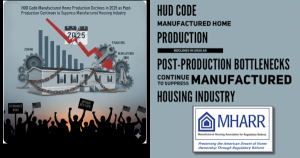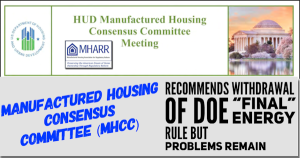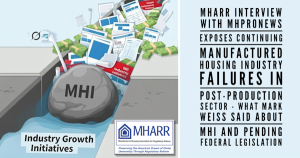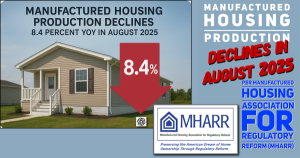Bottlenecks Suppressing Manufactured Housing Industry Continue Unabated
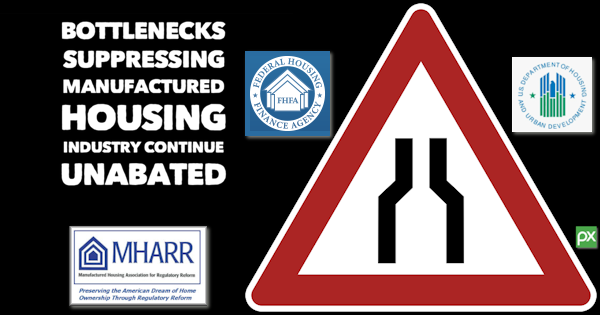
BOTTLENECKS SUPPRESSING MANUFACTURED HOUSING INDUSTRY CONTINUE UNABATED
Washington, D.C., May 2, 2024 – The Manufactured Housing Association for Regulatory Reform (MHARR) in May 1, 2024 communications to both Federal Housing Finance Agency (FHFA) Director Sandra L. Thompson and U.S. Department of Housing and Urban Development (HUD) Acting Secretary Adrianne Todman (copies attached), has called for specific and immediate action to clear away the two principal bottlenecks that continue to suppress the production, marketing and availability of affordable, mainstream HUD Code manufactured housing in the midst of an unprecedented affordable housing crisis.
At a time when housing affordability in the United States has reached an all-time low according to press reports, the production of inherently affordable, mainstream manufactured housing, costing, on average, less than 25% of the price of an average site-built home, according to the most recent available annual U.S. Census Bureau data, fell more than 21% in 2023, to 89,169 homes. This marks the 15th year since 2007, that annual manufactured housing industry production has fallen below the crucial 100,000 home benchmark – a benchmark that was routinely and regularly exceeded in earlier years and decades.
While there are multiple factors having a negative impact on the affordable, mainstream manufactured housing market, there are two in particular that, over the long-term, have prevented the industry from reaching its full potential as the nation’s premiere source of affordable, non-subsidized homeownership. These post-production bottlenecks, specifically addressed in MHARR’s May 1, 2024 communications are: (1) the failure of FHFA and the FHFA-regulated Government Sponsored Enterprises (GSEs) (i.e., Fannie Mae and Freddie Mac), to provide any type of securitization or secondary market support for the dominant personal property consumer financing sector of the manufactured housing market under the statutory Duty to Serve Underserved Markets (DTS) mandate; and (2) HUD’s failure to utilize the enhanced federal preemption of the Manufactured Housing Improvement Act of 2000 (2000 Reform Law) (i.e., existing law) to invalidate – or even challenge – discriminatory and exclusionary zoning laws targeting manufactured housing and manufactured housing residents.
Because of the combined effects of the persistent failure of federal government agencies and related federal officials to comply with these clear and unambiguous statutory mandates, affordable manufactured homes are effectively banned (with no consequence) from many areas of the United States where the need for affordable homeownership is greatest, while millions of potential manufactured homebuyers are forced to seek purchase money loans at unnecessarily high and arguably excessive (or “predatory”) interest rates that can – and do – exclude many lower and even moderate-income Americans. Both such failures – in violation of applicable law — have inevitably undermined the affordable housing role of mainstream HUD Code manufactured housing and are unacceptable.
To be sure, the industry itself shares part of the responsibility and part of the blame for the continued existence and even exacerbation of both of these major failures. In particular, the industry’s national post-production representation has failed to hold these government agencies – FHFA and HUD – accountable for their long-term failure to comply with and vigorously enforce these statutory mandates for the benefit of American consumers of affordable housing. Instead, following an April 18, 2024 Senate “oversight” hearing, where neither agency head was pressed, at all, on their agencies’ fundamental long-term failure to support the availability of affordable manufactured homes in accordance with these statutory mandates, that representative – the Manufactured Housing Institute (MHI) — instead lavished praise on those officials. A long-time industry veteran later highlighted this clear and inexcusable disconnect, contrasting MHI’s baseless praise with the officials’ failure to deliver for the vast bulk of both consumers and the industry, stating: “So where does reality … end and 2024 gas lighting begin? Just what [do] FHFA and the GSEs really do in behalf and support of the manufactured housing industry?” He could have added, “what has HUD done, with the power and authority that it already has, to prevent zoning discrimination and the exclusion of manufactured homes that HUD itself regulates?”
In Washington, D.C., MHARR President and CEO Mark Weiss stated: “The needless long-term suppression of the mainstream manufactured housing market by these two major issues, in clear violation of applicable federal law, is an industry post-production problem that must be confronted by those entrusted with that responsibility. History shows that the HUD Code industry is capable of performing much better than it has over the past nearly-two decades. Clearing the zoning and DTS/personal property lending bottlenecks will go a long way to achieving this goal.”
The Manufactured Housing Association for Regulatory Reform is a Washington, D.C.- based national trade association representing the views and interests of independent producers of federally-regulated manufactured housing.


BOTTLENECKS SUPPRESSING MANUFACTURED HOUSING INDUSTRY CONTINUE UNABATED
Washington, D.C., May 2, 2024 – The Manufactured Housing Association for Regulatory Reform (MHARR) in May 1, 2024 communications to both Federal Housing Finance Agency (FHFA) Director Sandra L. Thompson and U.S. Department of Housing and Urban Development (HUD) Acting Secretary Adrianne Todman (copies attached), has called for specific and immediate action to clear away the two principal bottlenecks that continue to suppress the production, marketing and availability of affordable, mainstream HUD Code manufactured housing in the midst of an unprecedented affordable housing crisis.
At a time when housing affordability in the United States has reached an all-time low according to press reports, the production of inherently affordable, mainstream manufactured housing, costing, on average, less than 25% of the price of an average site-built home, according to the most recent available annual U.S. Census Bureau data, fell more than 21% in 2023, to 89,169 homes. This marks the 15th year since 2007, that annual manufactured housing industry production has fallen below the crucial 100,000 home benchmark – a benchmark that was routinely and regularly exceeded in earlier years and decades.
While there are multiple factors having a negative impact on the affordable, mainstream manufactured housing market, there are two in particular that, over the long-term, have prevented the industry from reaching its full potential as the nation’s premiere source of affordable, non-subsidized homeownership. These post-production bottlenecks, specifically addressed in MHARR’s May 1, 2024 communications are: (1) the failure of FHFA and the FHFA-regulated Government Sponsored Enterprises (GSEs) (i.e., Fannie Mae and Freddie Mac), to provide any type of securitization or secondary market support for the dominant personal property consumer financing sector of the manufactured housing market under the statutory Duty to Serve Underserved Markets (DTS) mandate; and (2) HUD’s failure to utilize the enhanced federal preemption of the Manufactured Housing Improvement Act of 2000 (2000 Reform Law) (i.e., existing law) to invalidate – or even challenge – discriminatory and exclusionary zoning laws targeting manufactured housing and manufactured housing residents.
Because of the combined effects of the persistent failure of federal government agencies and related federal officials to comply with these clear and unambiguous statutory mandates, affordable manufactured homes are effectively banned (with no consequence) from many areas of the United States where the need for affordable homeownership is greatest, while millions of potential manufactured homebuyers are forced to seek purchase money loans at unnecessarily high and arguably excessive (or “predatory”) interest rates that can – and do – exclude many lower and even moderate-income Americans. Both such failures – in violation of applicable law — have inevitably undermined the affordable housing role of mainstream HUD Code manufactured housing and are unacceptable.
To be sure, the industry itself shares part of the responsibility and part of the blame for the continued existence and even exacerbation of both of these major failures. In particular, the industry’s national post-production representation has failed to hold these government agencies – FHFA and HUD – accountable for their long-term failure to comply with and vigorously enforce these statutory mandates for the benefit of American consumers of affordable housing. Instead, following an April 18, 2024 Senate “oversight” hearing, where neither agency head was pressed, at all, on their agencies’ fundamental long-term failure to support the availability of affordable manufactured homes in accordance with these statutory mandates, that representative – the Manufactured Housing Institute (MHI) — instead lavished praise on those officials. A long-time industry veteran later highlighted this clear and inexcusable disconnect, contrasting MHI’s baseless praise with the officials’ failure to deliver for the vast bulk of both consumers and the industry, stating: “So where does reality … end and 2024 gas lighting begin? Just what [do] FHFA and the GSEs really do in behalf and support of the manufactured housing industry?” He could have added, “what has HUD done, with the power and authority that it already has, to prevent zoning discrimination and the exclusion of manufactured homes that HUD itself regulates?”
In Washington, D.C., MHARR President and CEO Mark Weiss stated: “The needless long-term suppression of the mainstream manufactured housing market by these two major issues, in clear violation of applicable federal law, is an industry post-production problem that must be confronted by those entrusted with that responsibility. History shows that the HUD Code industry is capable of performing much better than it has over the past nearly-two decades. Clearing the zoning and DTS/personal property lending bottlenecks will go a long way to achieving this goal.”
The Manufactured Housing Association for Regulatory Reform is a Washington, D.C.- based national trade association representing the views and interests of independent producers of federally-regulated manufactured housing.



